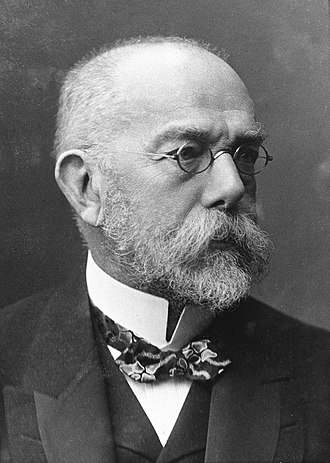Robert Koch Institute

Robert Koch Institute (RKI) is a German federal government agency and research institute responsible for disease control and prevention. It is named after Robert Koch, a renowned bacteriologist who is considered one of the main founders of modern bacteriology. The institute is an important body for the public health system in Germany and plays a crucial role in monitoring infectious diseases, conducting research, and advising the government on public health issues.
History[edit]
The Robert Koch Institute was founded in 1891 as the Royal Prussian Institute for Infectious Diseases in Berlin, following the pioneering work of its namesake, Robert Koch. Koch's discoveries, including the identification of the causative agents of tuberculosis, cholera, and anthrax, laid the groundwork for the institute's mission. Over the years, the institute has evolved in response to changing public health challenges and advancements in medical science.
Mission and Functions[edit]
The primary mission of the RKI is to protect and improve the health of the population in Germany. Its functions include:
- Monitoring and analysis of the health status of the population
- Detection, prevention, and control of infectious diseases
- Conducting research on infectious diseases, non-communicable diseases, and other health issues
- Development of public health strategies and recommendations
- Health information and risk communication to professionals and the public
- Collaboration with national and international health organizations
Research and Surveillance[edit]
One of the key activities of the RKI is the surveillance of infectious diseases. This involves the collection, analysis, and dissemination of data on disease outbreaks and trends. The institute uses this information to assess public health risks and to inform decision-making by health authorities.
The RKI also conducts a wide range of research projects in areas such as epidemiology, health protection, and biomedical sciences. This research contributes to the understanding of disease mechanisms, the development of new diagnostic methods, and the evaluation of interventions to prevent and control diseases.
Public Health Advice and Crisis Management[edit]
In times of public health crises, such as the COVID-19 pandemic, the Robert Koch Institute plays a central role in managing the response. It provides evidence-based guidance and recommendations to health professionals, policymakers, and the public. The RKI also coordinates with other health agencies and organizations to ensure a coherent and effective response to health threats.
Facilities and Organization[edit]
The Robert Koch Institute is headquartered in Berlin, with additional facilities in other parts of Germany. It is organized into several departments and units that specialize in different areas of public health and research. The institute is overseen by the Federal Ministry of Health and works closely with other health agencies at the federal and state levels.
Conclusion[edit]
The Robert Koch Institute is a vital institution in Germany's public health landscape. Through its work in disease surveillance, research, and public health guidance, the RKI contributes significantly to the prevention and control of diseases and the promotion of public health in Germany and beyond.
Ad. Transform your life with W8MD's Budget GLP-1 injections from $49.99


W8MD offers a medical weight loss program to lose weight in Philadelphia. Our physician-supervised medical weight loss provides:
- Weight loss injections in NYC (generic and brand names):
- Zepbound / Mounjaro, Wegovy / Ozempic, Saxenda
- Most insurances accepted or discounted self-pay rates. We will obtain insurance prior authorizations if needed.
- Generic GLP1 weight loss injections from $49.99 for the starting dose of Semaglutide and $65.00 for Tirzepatide.
- Also offer prescription weight loss medications including Phentermine, Qsymia, Diethylpropion, Contrave etc.
NYC weight loss doctor appointmentsNYC weight loss doctor appointments
Start your NYC weight loss journey today at our NYC medical weight loss and Philadelphia medical weight loss clinics.
- Call 718-946-5500 to lose weight in NYC or for medical weight loss in Philadelphia 215-676-2334.
- Tags:NYC medical weight loss, Philadelphia lose weight Zepbound NYC, Budget GLP1 weight loss injections, Wegovy Philadelphia, Wegovy NYC, Philadelphia medical weight loss, Brookly weight loss and Wegovy NYC
|
WikiMD's Wellness Encyclopedia |
| Let Food Be Thy Medicine Medicine Thy Food - Hippocrates |
Medical Disclaimer: WikiMD is not a substitute for professional medical advice. The information on WikiMD is provided as an information resource only, may be incorrect, outdated or misleading, and is not to be used or relied on for any diagnostic or treatment purposes. Please consult your health care provider before making any healthcare decisions or for guidance about a specific medical condition. WikiMD expressly disclaims responsibility, and shall have no liability, for any damages, loss, injury, or liability whatsoever suffered as a result of your reliance on the information contained in this site. By visiting this site you agree to the foregoing terms and conditions, which may from time to time be changed or supplemented by WikiMD. If you do not agree to the foregoing terms and conditions, you should not enter or use this site. See full disclaimer.
Credits:Most images are courtesy of Wikimedia commons, and templates, categories Wikipedia, licensed under CC BY SA or similar.
Translate this page: - East Asian
中文,
日本,
한국어,
South Asian
हिन्दी,
தமிழ்,
తెలుగు,
Urdu,
ಕನ್ನಡ,
Southeast Asian
Indonesian,
Vietnamese,
Thai,
မြန်မာဘာသာ,
বাংলা
European
español,
Deutsch,
français,
Greek,
português do Brasil,
polski,
română,
русский,
Nederlands,
norsk,
svenska,
suomi,
Italian
Middle Eastern & African
عربى,
Turkish,
Persian,
Hebrew,
Afrikaans,
isiZulu,
Kiswahili,
Other
Bulgarian,
Hungarian,
Czech,
Swedish,
മലയാളം,
मराठी,
ਪੰਜਾਬੀ,
ગુજરાતી,
Portuguese,
Ukrainian
